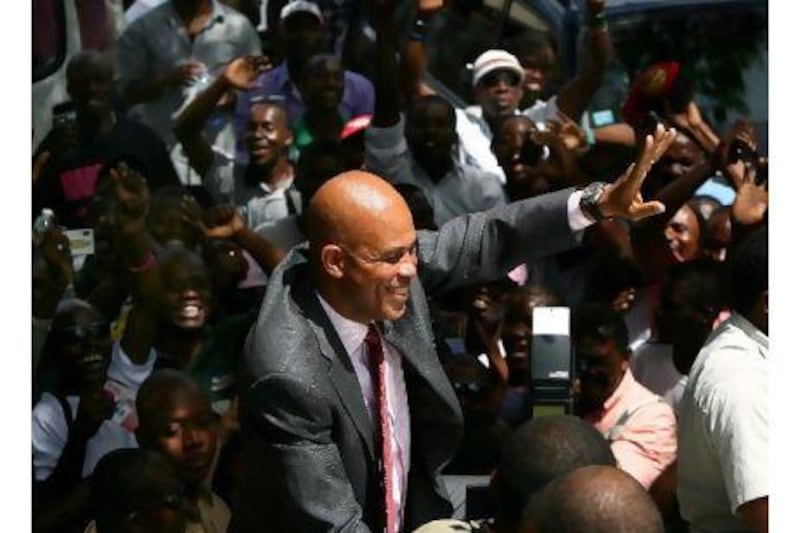When he went by the name "Sweet Micky", Michel Martelly was known for his show-stopping performances as a carnival entertainer who laced his acts with a bit of burlesque and satire.
After emerging as the winner of last month's presidential run-off vote in Haiti, Mr Martelly must now give a performance of a lifetime. He has pledged to tackle political cronyism and incompetence in a nation devastated by natural disaster, poverty and corruption.
The quake-struck capital, Port-au-Prince, erupted into a carnival-like scene on Monday when officials announced preliminary results of the run-off ballot that gave Mr Martelly a seemingly unbeatable 68 per cent share of the vote. As portable stereos blasted the showman's tunes at impromptu street parties, questions lingered over whether this shaven-headed political novice has the skills needed to handle parliament and mend a battered nation.
Marilyn Allien, Haiti's head of the graft watchdog Transparency International, said: "The vote was a slap in the face for a political class that has not shown commitment to change, from a population that is frustrated by slow reconstruction and other horrible problems this past year.
"My concern is that Martelly does not have the knowledge or capacity to be at the helm of the country at such a crucial time."
Initial results from the run-off vote on March 20 may face legal hurdles before being approved later this month. But Mr Martelly's rival, the former first lady Mirlande Manigat, tallied less than 32 per cent, making the continuation of violence that has marred Haiti's election process unlikely.
This is good news for the UN, which has more than 12,000 peacekeepers trying to stabilise Haiti, and for the United States, which does not want an imploding state on its doorstep spilling poor migrants across its shores.
Mr Martelly swung voters with a mantra of "change" and promised to become an inspirational figurehead with "moral authority" who could restore a sense of "dignity and pride" by limiting reliance on foreign aid.
He had to first ditch his reputation as "Sweet Micky", whose repertoire of on-stage antics featured wigs, nappies and even dropping his trousers and "mooning" the crowd.
He donned dapper business suits for an election campaign that advertised his charisma more than policies, and was marked by the Creole slogan Tet Kale - meaning both "shaved head" and "all the way".
Analysts say he appealed to Haiti's many young voters and promised unity in a society fractured by class and race, thrashing Ms Manigat, 70, and her links to the elite.
The UN secretary general, Ban Ki-moon, said the victor would "inherit a set of daunting challenges" in a report, including the 680,000 people who have been living in makeshift camps erected after last year's earthquake.
Haiti was the poorest country in the Americas even before the 7.0-magnitude quake levelled the capital and killed 230,000 people. Even more - 240,000 - have since acquired a cholera infection that has claimed at least 4,600 lives.
Mr Martelly must convince international donors, which pledged $10 billion (Dh36.7bn) in post-quake aid but have been reluctant to untie the purse strings, that he is a trustworthy executive who will not squander the funding.
"Everybody is holding their breath to see his proposals," said a foreign aid worker, speaking anonymously. "He doesn't have much political or academic experience - but then again, the people in power have not done much good either."
The International Organisation for Migration reminded officials of the land rights crisis that has stalled reconstruction, warning this week that almost one quarter of those still left homeless by the quake - some 166,000 people - face eviction.
The agency's chief in Haiti, Luca Dall'Oglio, said camp-dwellers are being forced out "under duress" and urged officials to address the problems of tent cities on private lots, incomplete land registries and finding space to build new homes.
Added to this, Mr Martelly must contend with the destabilising influence of the surprise return of two former presidents: the dictator Jean-Claude Duvalier, better-known as "Baby Doc", and the shantytown priest Jean-Bertrand Aristide.
Mr Duvalier faces prosecution for torture and other rights violations during his rule. Mr Aristide, who rose to power as a champion of Haiti's predominantly Catholic poor, was welcomed back by thousands of supporters last month.
Upon taking office next month, Mr Martelly will have to tackle poverty, homelessness and soaring unemployment rates through a parliament likely to be dominated by the party of the outgoing president Rene Preval, INITE, which was humiliated by electoral defeat.
Louis Marcelin, a University of Miami anthropology professor., said: "Traditional politicians and their decisions were not respected and they were rejected by the people. Martelly needs competent people around him and to become a leader who is above politics, who unites the country and carries it in a direction.
"If he creates these conditions, then we have a chance. If he continues in the path of traditional politicians - Haiti is dead."







